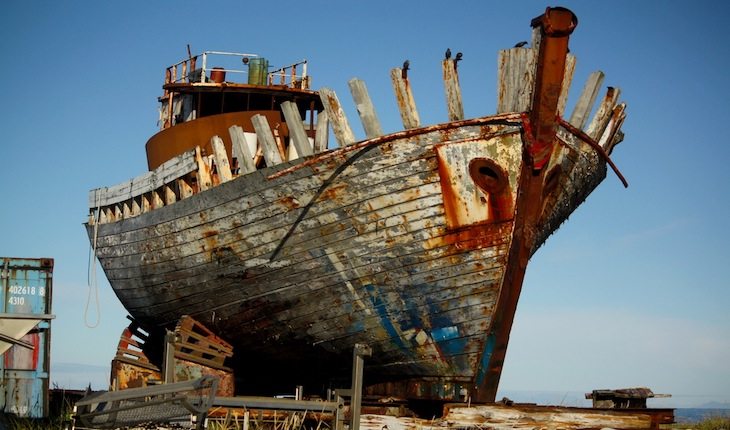Vessel scrapping a viable opportunity for South Africa?

12 Dec 2016
Early in November the fishing trawler “Verano” caught fire in Cape Town harbour. She is a very old vessel, built in 1975, weighing in at 3,979 gross tons. Four weeks after the five day blaze and she can be seen still alongside in the harbour, listing quite severely to port, but fortunately in no immediate danger of sinking. She has been declared a total loss, destined to be sold as scrap. Salvors will spend the next few months stabilising the vessel by removing excess water, oil, chemicals and asbestos (still prevalent in vessels built before 1980) before she takes her final journey to the scrapyard to be cut up and recycled.
The scrapping of vessels (also referred to as ship breaking, dismantling or recycling) is an important and necessary component of the “cradle to grave” operational life cycle of a ship. In the case of the “Verano”, the vessel was clearly coming to the end of her lifespan and would have been scrapped sooner or later regardless of the recent fire. Given the depressed current state of the shipping industry as a whole (particularly in the dry bulk segment) vessels are being sent to the breakers at far younger ages than ever before as a consequence of significant oversupply in the market.
While such “recycling” (to use the more benign term) is clearly an indispensable part of the shipping industry, it has come under fire over the past 15 years or so due to deplorable and unsafe conditions for workers and unsustainable, damaging environmental practices which often occur in countries such as India, Pakistan, Bangladesh – the major ship breaking centres where most large vessels are sent to be scrapped as cheaply as possible in order to maximise on the value of steel and other materials which can be used or sold. While there are many operations which offer a safer and more regulated, environmentally friendly approach, the cost of scrapping using these “greener” facilities will invariably be more expensive due to the infrastructure which has been put in place (a contained dry dock facility is a lot more expensive to establish and maintain than a tidal beach in India).
In this context, the International Maritime Organisation in 2009 signed off the Hong Kong Convention on the Safe and Environmentally Sound Recycling of Ships. The Convention aims to ensure that ships being recycled at the end of their operational lives do not pose an unnecessary risk to human health and safety or the environment and in this regard places certain obligations on the flag state. Nearly seven years on and only a handful of countries have in fact ratified the convention, including Norway and France and, more recently, Denmark and Panama. Panama’s accession to the Convention is noteworthy given that it is currently the world’s largest and most popular flag state for registration of vessels. The Convention will only come into operation once it has been ratified by fifteen countries and, while not there yet, the general consensus is that it represents the future of global minimum standards for ship recycling. Ship owners are also facing greater social pressure to ensure that their tonnage is scrapped in a sustainable manner.
In a talk presented by Dr Henrietta van Niekerk at the Durban Maritime Summit held earlier this year, she warned that South Africa should be cautious in viewing the development of the local shipbuilding industry as an economic game changer under the auspices of the Government’s “Operation Phakisa” initiative. Dr Van Niekerk is director and head of dry bulk analysis for leading shipping services group, Clarksons, and cited the prevailing weak shipping market conditions and the problem of oversupply in vessel capacity as being inimical to a positive outcome for growing a local shipbuilding industry. As an alternative, it was suggested that opportunities (although admittedly “drastic”) might exist in the development of infrastructure for the scrapping or demolishing of ships in South Africa, which enjoys a favourable strategic location on a number of shipping routes. The Department of Transport has in fact considered this possibility in its South African Maritime Transport Sector Study dated 27 July 2011. While recognising health and environmental issues associated with the scrapping of large vessels as being the main disadvantage, it was proposed that green ship recycling be introduced into the South African economy in a manner that will assure compliance with the Hong Kong Convention. The Port of Ngqura was identified as a possible location for such a facility and the theory is that as the world (and ship owners) moves toward a global standard for scrapping, compliant ship recycling facilities will be in great demand.
Such an approach could indeed offer many economic benefits in the years to come. Given that ship dismantling is hugely work-intensive, it certainly offers significant opportunities for job creation as well as for international trade in recycled materials. There are, however, a number of hurdles which would need to be overcome before this could become a reality, starting with the existing regulatory environment. For example, ship breaking is currently not permitted by Transnet in any South African ports and finding another possible site would be problematic in terms of existing environmental and coastal management legislation. It would obviously also be desirable for Government to ratify the Hong Kong Convention as soon as possible.
* This article first appeared in the Sunday Tribune
(This article is provided for informational purposes only and not for the purpose of providing legal advice. For more information on the topic, please contact the author/s or the relevant provider.)
